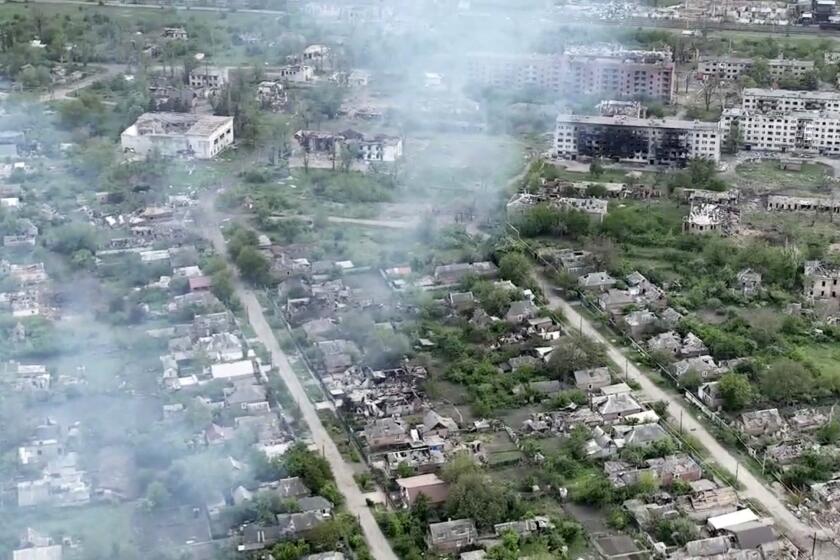Probe of Nazi War Criminal Case Raises Ethics Questions : Government: A former Justice Dept. attorney said he resigned over handling of possibly exculpatory evidence concerning the accused.
A former Justice Department attorney testified Thursday that he was so troubled by “ethical concerns” about the government’s case against an accused Nazi war criminal that he resigned his job after superiors decided to proceed with the case.
John Demjanjuk, a retired Cleveland auto worker accused of being the sadistic death camp guard “Ivan the Terrible,” subsequently was extradited to Israel, where he was convicted and now awaits execution.
He is appealing the death sentence while his lawyers continue to press claims in this country that he was improperly extradited because the Justice Department withheld evidence that Demjanjuk was not, in fact, Ivan the Terrible.
George Parker, a former government trial lawyer who worked on the case, testified Thursday in an unusual special hearing held to examine the department’s handling of the matter. He said that evidence turned over to the Justice Department by Soviet investigators--which was never made available to Demjanjuk’s lawyers--indicated that another man, Ivan Marchenko, operated the gas chamber and committed atrocities at the Treblinka death camp in Poland.
Parker said the government’s handling of the case was “inappropriate and unethical” because it proceeded despite contradictory testimony from witnesses. There was also evidence that Demjanjuk, while an SS guard, was not at Treblinka but was instead assigned to other concentration camps.
Parker answered questions Thursday about a Feb. 28, 1980, memorandum he wrote to superiors outlining flaws in the government’s case and discussing specific incidents in which Demjanjuk’s lawyers asked for evidence.
The unwritten policy in the Justice Department, he said, was to provide only requested information to defense attorneys.
He said some requests by Demjanjuk’s lawyers were denied because they were too broad. But he said he and others in the Justice Department did not improperly withhold evidence.
U.S. District Judge Thomas Wiseman, who was appointed by the 6th U.S. Circuit Court of Appeals to act as special master to determine whether the Justice Department improperly withheld evidence, questioned Parker on whether he was familiar with a rule requiring that exculpatory evidence be provided even if no specific request has been made.
Parker replied that the department operated under more restrictive federal rules and procedures, which allows counsel to request evidence but does not require voluntary disclosures.
“You would wait for the right questions to be asked and you wouldn’t do anything voluntarily?” Wiseman asked.
“I think that’s a correct statement,” Parker replied.
Under questioning from his own counsel, Parker characterized himself as inexperienced with criminal law and the rules of evidence in criminal cases.
After Walter J. Rockler, the director of Parker’s section, decided to continue with extradition proceedings against Demjanjuk, Parker said, “I continued to work on the case in a professional manner, not sabotaging it . . . and I made a decision that I was going to leave the office.”
The investigation into the handling of the Demjanjuk case is one of two potentially embarrassing inquiries into the Justice Department’s handling of high-profile cases involving war crimes.
The Justice Department’s Office of Professional Responsibility is conducting an inquiry into the department’s handling of a case against Andrija Artukovic, a Seal Beach, Calif., resident who died in 1988 of natural causes in a Yugoslav prison. He was extradited there for alleged war crimes committed while he was minister of the interior in a Nazi puppet government in wartime Croatia.
The new Artukovic inquiry is based largely on information uncovered by a Florida historian employed by Artukovic’s son, Radoslav A. Artukovic, a Los Angeles stockbroker who has never given up defending his father.
The appointment of a special master in the Demjanjuk case was prompted by news reports in Israel and the United States that raised questions about the handling of evidence in the case.
Wiseman will conduct hearings, which might be spread out over several months, and then make recommendations to the court.
Even if the court finds that Demjanjuk was improperly extradited, appeal of his death sentence is in the hands of Israeli courts.
More to Read
Start your day right
Sign up for Essential California for news, features and recommendations from the L.A. Times and beyond in your inbox six days a week.
You may occasionally receive promotional content from the Los Angeles Times.





